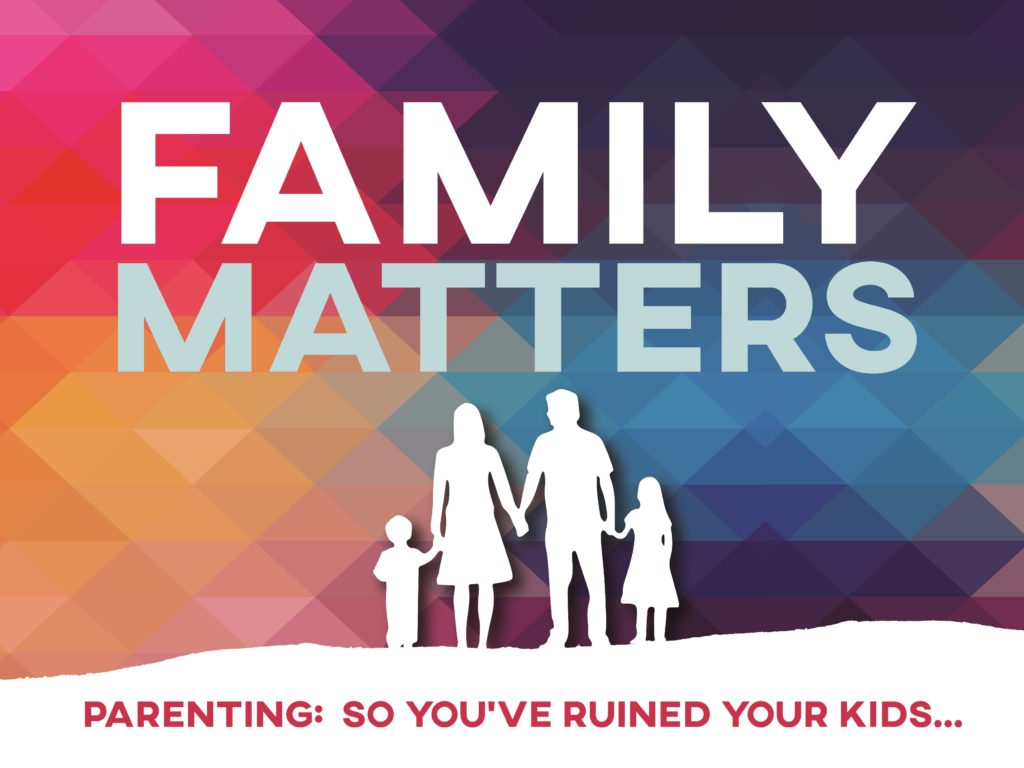
(I didn’t get the last part of that sermon posted over the weekend. I tackled my storage shed in the backyard, replacing all the wood on the corners and around the door frame, and re-painting the whole thing. The paint color I carefully selected is “Elephant Gray,” but it looks really blue. I hate painting. Here’s the last part of the “Parenting: So, You’ve Ruined Your Kids…” sermon that concludes all the posts from last week.)
Some of you have kids who are already grown with children of their own. And they did not turn out the way you hoped. They didn’t turn out the way you planned and the way you prayed. They’re not in a good place. Maybe your children are not in a good place with their spouse and their own family, they’re not in a good place with their career or their health, they’re not in a good place with our Lord. And you know you did the very best you could. You tried as hard as you could to raise him right, you did everything possible to raise her right. But the more you look back, the more you see how you could have done things differently. You see where you should have done things differently. You realize your mistakes. You see where you messed some things up. And you have regrets. You feel guilt. And shame. How did she wind up like this? How did he turn out that way? Sometimes you feel like you must have been a terrible parent.
The Lord redeems all that. Our crucified and risen Lord Jesus takes care of all that.
I’m not going to tell you, “No, come on, you were a great father!” because you would rationalize that I don’t know the full situation. And you’d be right. And I’m not going to say, “Your mistakes as a parent didn’t really matter to your kids,” because you wouldn’t believe me. And, frankly, our parenting mistakes do have an impact. No. What I’m really trying to do is point you to the cross. The Lord can redeem your parenting story by joining it to the forgiveness and restoration story of the cross. I don’t want to reassure you about your performance as a parent. I want to offer you something much better: a word of grace.
“Which of you, if his son asks for bread, will give him a stone? Or if he asks for a fish, will give him a snake? If you, then, though you are evil, know how to give good gifts to your children, how much more will your Father in heaven give good gifts to those who ask him?” ~Matthew 7:9-11
God redeems your failures at the cross. Whatever absence, whatever neglect, whatever harshness or abuse, whatever character traits you’ve passed on to your kids, whatever harmful habits or practices they picked up, whatever sins real or imagined — all of that is forgiven and dealt with at the cross. You don’t have to be taken down by guilt or paralyzed by regrets. In all your sins, in all your failures, in all your mistakes, you know what’s best for your kids. How much more does God know what you need and what your children need and how to give it to you in buckets?
Maybe you’ve got a prodigal son or a lost daughter. Maybe your family is intact and everybody loves each other, but you have this one child who hasn’t received the Christian faith. That’s so hard. Or maybe your grown child is outwardly and verbally resentful and hateful to you, maybe he or she is even involved in dangerous or destructive behavior. That’s agony for parents. It’s horrible. How did this happen? What did we do wrong?
Listen, you’re not just dealing with a prodigal child; God is dealing with a prodigal universe! Sin and rebellion against God is universal, it’s in the stream of the human race. Raising children is not the same as raising cattle or programming code into a computer. It’s not always cause and affect like that; it’s not always that black-and-white, input-and-output. People rebel against what they’ve been taught. Humans turn their backs on God and the people who love them. We can’t always know how or why things go foul.
Here’s what we DO know.
Our God is the perfect Father and he knows how you feel. He, too, agonizes over his rebellious children and his children who are not in a great place. He’s not distant from that. He suffers and dies on a cross for us. And with us. Our kids belong to the Lord, not to us. How much more…? There’s mercy in that.
John Stott used to talk about the great temples in Asia where he would see statues of Buddha: placid, remote-looking, arms crossed, eyes closed, softly smiling. In Stott’s mind and heart, he says he would have to turn away from that image and look instead to that “lonely, twisted, tortured figure on the cross, nails through his hands and feet, back lacerated and bleeding, limbs wrenched out of joint, brow pierced with thorns, mouth intolerably dry and thirsty, plunged in God-forsaken darkness.”
That’s our God. He is not distant from your pain. He’s crucified by it. In it. He’s crucified with it. And with you.
And we know that God’s Holy Spirit can convict anyone of sin and bring anyone to a saving faith in Christ, even after years and decades of running. The Spirit blows where he wills and we can’t track him. We can only watch the leaves flutter as he goes by.
God’s got this. Trust him to forgive you by his love and to take care of your child by his grace. Keep loving your grown children as best you can, keep all those connections open, so our prodigals know how to get home and that you’ll meet them on the road and throw a massive celebration feast when they do. God wants them saved and restored more than you do. Whatever mistakes you’ve made along the way are not going to stop God. How much more…? The crucified Christ bears your sins for you, he takes on the curse that we’ve brought on ourselves.
Our children, in our families and in our church, represent newness of life. They are the on-going providence of God. That’s why the powers of hell come after our children so hard, from Pharaoh and Herod to the sex-trafficking and abortion industries. The powers are after our kids. When we embrace children, when we love our kids, we’re sharing in the joy of the future. Children point us to the truth that the world has a future and God’s Church has a future.
Parenting is like the cross; unconditional love, sacrificial service, and pain. And unsurpassed glory. We bless our children by parenting by the cross. We don’t weigh them down with expectations we could never bear ourselves. We keep our promises as best we can. We forgive them, we forgive each other, and we forgive ourselves.
We — all of us together — have a future and a hope, one that is wrapped up in the life, death, and resurrection of Jesus. Our plans may evaporate, our dreams may get crushed. You’re not as consistent with the discipline or as committed to the priorities as you’d like. Sometimes you’re too harsh and sometimes you’re too lenient. Yeah, me, too. But our God’s love and grace for his people never ever stops. God’s mercies never cease and his promises never fail. So we can have babies and parent our children and unflinchingly trust our God.
Peace,
Allan







Recent Comments